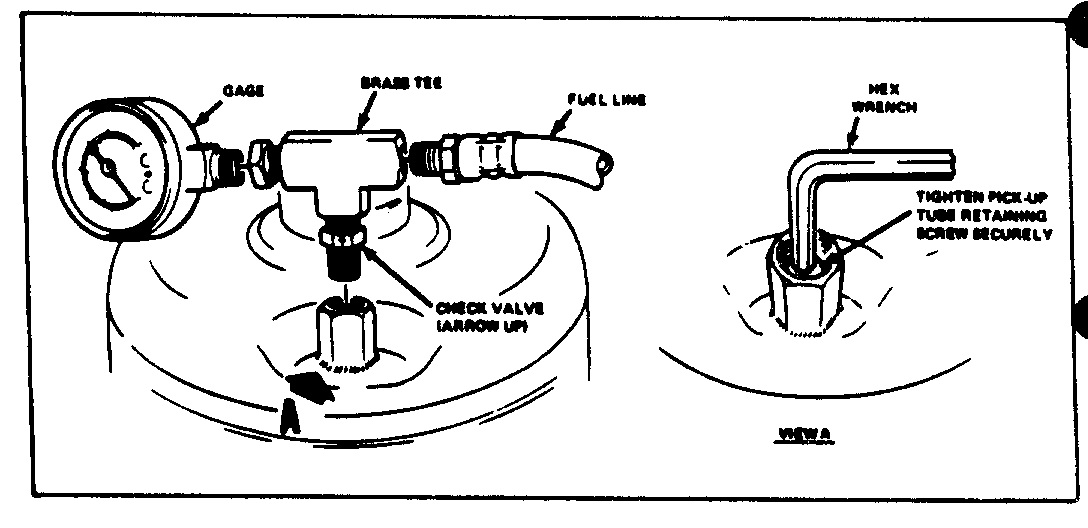ON VEHICLE CLEANING OF PORT FUEL INJECTORS

MODELS AFFECTED: ALL 1985 AND 1986 CIMARRONS EQUIPPED WITH 2.8L V-6 PORT FUEL INJECTED ENGINES
Some 1985 ano 1986 Cimarrons equipped with the 2.8L V-6 engine may experience any of the following conditions:
Lean Surge Engine Miss Tip-in Hesitation T.C.C. chuggle Cold Start Sag Rough Idle Hard Starting Lack of Power
These conditions may be due to fuel deposits on the injector tips which may reduce fuel flow and cause a lean condition. The following procedure should be followed to remove injector deposits instead of replacing injectors.
The Kent Moore Injector Cleaning Tool,J-35900, has been made an essential tool and makes it possible to clean fuel injectors without removing the fuel rail or injectors from the vehicle. If the Kent-Moore tool has not been used previously, make sure the fuel pick-up tube retaining screw is fully tightened as shown in view A, Figure 1. Failure to do so could cause an internal leak and not allow the gasoline/cleaner mixture to enter the fuel system. Use back-up wrenches on all fittings when removing and installing.
Lean injectors should be identified by performing the injector balance test, chart C-2A in Section 6E3 of the Cimarron Service Information Manual, prior to performing this procedure. If no lean injectors are found, refer to Section B Symptoms in Section 6E3 for diagnostic assistance and correct any conditions found. If lean injectors are found, the following procedure is recommended for GM port injection systems equipped with a pressure test connection.
NOTICE: BEFORE USING THIS DEVICE THE VEHICLE FUEL SYSTEM MUST HOLD PRESSURE. IF THE FUEL SYSTEM DOES NOT HOLD PRESSURE, REPAIR AS REQUIRED. ENGINE MUST BE FULLY WARMED UP AND SHUT OFF BEFORE CONNECTING THIS TOOL.
1. Disable the vehicle in-tank fuel pump by disconrecting the pump feed wiring connector at the tank.
2. Disconnect vacuum line at the fuel pressure regulator.
3. Place approximately 50 ounces of the cleaning solution (three pints of gasoline and 2.5 ouncess of Top Engine Cleaner or Carburetor Tune-Up Conditioner) to the J-35800 tank.
NOTICE: CONCENTRATION OF THE CLEANING SOLVENT MUST NOT EXCEED 5%. DO NOT ADD GM TOP ENGINE CLEANER OR AC-DELCO CARBURETOR TUNE-UP CONDITIONER DIRECTLY INTO THE GASOLINE TANK, AS DAMAGE TO THE FUEL TANK MAY RESULT. USE ONLY APPROVED INJECTOR CLEANING SOLVENTS, SUCH AS, GM TOP ENGINE CLEANER, P/N 1050002, OR AC-DELCO CARBURETOR TURN-UP CONDITIONER, X-66P.
4. Set up equipment with feed hose connected to fuel rail pressure test connection. Do not exceed 25 psi supply pressure.
5. Open in line valve on J-35800 1/2 turn.
6. Start and run engine at 2000 R.P.M. for approximately 15 minutes.
7. Close in line valve on J-35800 and disconnect tool, recap test fitting, and reconnect vehicle fuel pump.
8. Immediately run engine for 5 minutes at 1000/2000 R.P.M. to flush cleaner from fuel rail and injectors.
9. Reconnect regulator vacuum line, verify idle quality and check for leaks.
After the injectors are cleaned, owners should be advised that use of fuels with detergent additives should keep the injectors clean. Premium unleaded gasolines generally contain lower levels of materials believed to form deposits, and higher levels of detergents than regular unleaded gasolines. Their occasional use could help prevent future inejctor deposit formation.
There are encouraging signs that oii companies are addressing deposit formation and will be providing regular and premium unleaded gasolines with higher levels of detergents which can prevent and in some cases even remove injector deposits. This will be a welcome development not only for Cadillac owners, but also for owners of other domestic and foreign cars equipped with port fuel injection system. Local gasoline advertising is one guideline for selecting fuels with high detergent content.
For warranty purposes use labor operation T1143 at 1.1 hours.

General Motors bulletins are intended for use by professional technicians, not a "do-it-yourselfer". They are written to inform those technicians of conditions that may occur on some vehicles, or to provide information that could assist in the proper service of a vehicle. Properly trained technicians have the equipment, tools, safety instructions and know-how to do a job properly and safely. If a condition is described, do not assume that the bulletin applies to your vehicle, or that your vehicle will have that condition. See a General Motors dealer servicing your brand of General Motors vehicle for information on whether your vehicle may benefit from the information.
